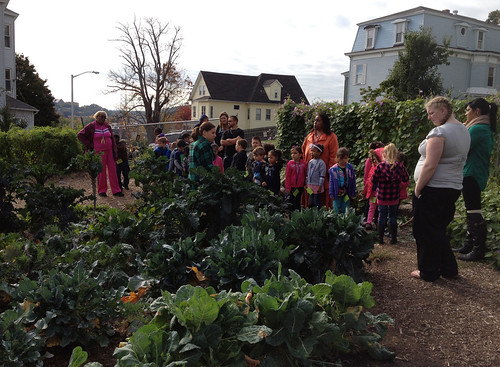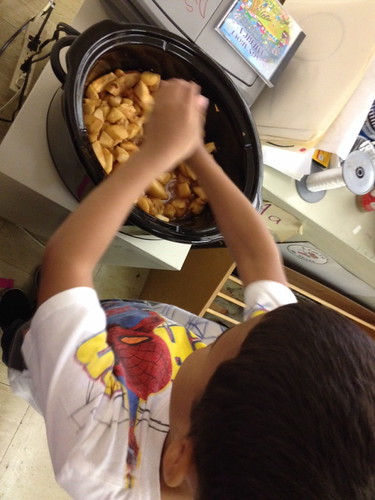
Massachusetts Farm to School Project and the Worcester Public Schools are helping kindergarteners understand how and where food is grown. They are teaching children about nutrition through local food tastings, farm and farmer visits, cooking demonstrations and take home produce. The Worcester Kindergarten Initiative is running at nine elementary schools in Worcester, MA, for the 2013-2014 school year! We are pleased to share this piece from the Worcester Kindergarten Initiative Evaluation and Education Specialist, Isabel Burgess.
Guest post by Isabel Burgess, Worcester Kindergarten Initiative Evaluation and Education Specialist
“This is so cool! Our first ever farm!” These are the sounds of kindergartners from Worcester, MA stepping onto one of the Regional Environmental Council’s YouthGROW farms. The farm is small – a vacant lot sandwiched between triple-deckers – but the students are thrilled. They spend the morning taking a tour of the farm; hearing about the youth farmers that manage the space; taste-testing chard and collards straight from the soil; and planting seeds of their own. The family members that joined their children on the trip are also excited to explore. They cannot believe that the farm is there – smack in the middle of the city, so close to where they live.
Field trips to local farms are just one piece of the Massachusetts Farm to School Project’s Worcester Kindergarten Initiative, a year-long holistic food education program made possible through partnership with Worcester Public Schools and based on a program created by The Food Trust. The program, which teaches kindergartners about healthy eating and where food comes from, now reaches 700 students in nine urban, predominantly low-income public schools. The KI’s primary component is a hands-on classroom curriculum taught weekly by kindergarten teachers. These lessons are supplemented by activities that engage students and their families through farm visits; taste-tests; cooking demonstrations; visits from the mobile farmers market and local farmers; and take-home packages of produce, recipes, and nutritional information.

The KI is all about making connections. The program aims to teach concepts that students can relate to in their classroom, cafeteria, and community. We hope that, in turn, kindergartners take what they learn home to share with their families. For example, in the fall students make applesauce as they learn about Johnny Appleseed and locally grown fruits. The next week, the mobile market comes to their schools for a visit and students explore the concept of a farmers market as one of the places we get our food. The market delivers each student a bag of local apples and pears, and applesauce recipes for them to take home to their families – with the idea that students are now equipped with both the knowledge of where to find local produce and how to teach their parents about a healthy “anytime” snack.
By starting at the literal and figurative roots of both healthy eating and Worcester’s youth, the KI is working to plant the seeds of lifelong nutrition and active engagement in the local food community.

